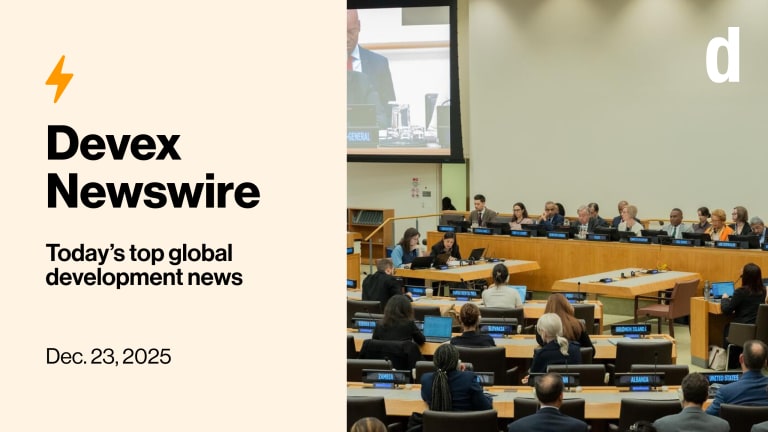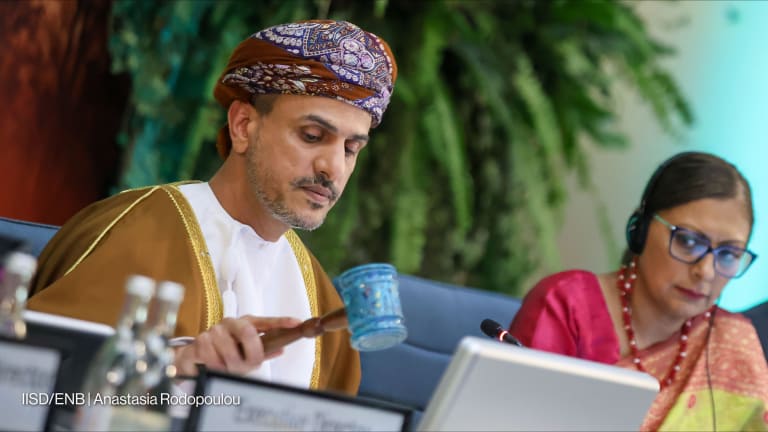Are pandemic treaty negotiations dividing the Africa group?
The Africa group coordinates its positions and negotiates as a unified bloc. But during the last negotiations, a few African countries took stances more aligned with the European Union on some key issues.
The last negotiations on the pandemic treaty revealed a split within the Africa group that some fear would compromise its bargaining position and undermine low- and middle-income countries' solidarity as they again engage in marathon talks this week to reach an agreement ahead of the 77th World Health Assembly. According to sources close to the talks, a few African countries aligned with the European Union’s proposed text on pathogen access and benefit-sharing, or PABS — a multilateral arrangement that facilitates access to virus samples and genetic sequence data with pandemic potential, and lays out obligations on users to share the benefits with countries through WHO. The benefits include access to health products and monetary contributions. They also agreed to the much contested “mutually agreed terms” provision on technology transfers, which experts say risks preventing equity as technology transfer is typically from high-income countries — that have the leverage to negotiate terms that are beneficial to them — to low-income countries. This caused major disagreements within the Africa group, and raised questions among other global south countries, they said. The Africa group coordinates its positions and negotiates as a unified bloc. And as a group representing 55 countries, it is seen as a powerful negotiating bloc in the negotiations. The latest fissure has some observers and insiders worried about the implications on the negotiations. “Others are saying they have betrayed continental interests,” one insider told Devex. “They might just not understand the wide scale implications of agreeing to EU positions too early." Countries are under pressure to reach an agreement within the next two weeks, despite still having 300 paragraphs to negotiate and agree on. Details on issues such as PABS and “One Health” — which is about ensuring the health of humans, animals, and the wider environment — are expected to be hammered out in separate, future processes. Observers said low- and middle-income countries have already made several concessions, while higher-income countries haven’t budged on issues they considered red lines, such as on intellectual property and the creation of a new fund. The original plan was to have an agreement adopted at WHA, which starts next Monday, and observers said there is pressure to make that happen. But they are concerned this could come at the cost of equity. “I understand that there is a need to conclude the negotiation. But at the same time, I don't see the reason that [countries] should agree for a highly inequitable agreement,” said K.M. Gopakumar, legal adviser and senior researcher with the Third World Network, an independent international nonprofit network that advocates for the needs of people from the global south. The disagreements Pathogen access and benefit-sharing has been a key sticking point in the negotiations. Global South countries want clear benefits, including a means to ensure materials shared in a database under the proposed system can easily be traced to ensure benefit-sharing. As one source puts it, without digital identifiers, how does one know where the genetic material used for developing health products came from? But midway through the last Intergovernmental Negotiating Body, or INB, session, sources privy to the negotiations said negotiators from Botswana, Ethiopia, Kenya, and South Africa sided with the United States and EU-proposed text that does not include traceability as a principle. It also proposes limiting access to medical products developed using the system to “up to” 20% instead of the “at least” 20% demanded by low- and middle-income countries. Sources said the Africa group as a whole didn’t support the EU-proposed text on PABS. According to a report by Geneva Health Files, the split occurred after these countries had a closed-door meeting with the U.S. and EU. Devex reached out to the four African countries on the split, but has yet to receive a response. However, Ambassador Amr Ramadan, permanent representative of Egypt to the United Nations Office and other international organizations in Geneva and vice chair of INB, wrote to Devex that “there is no split in the African Group.” “It is a big group with diverse opinion on approaches to the same objective,” he said. On the PABS text, he said a “core group of mainly three delegations” that included Ethiopia, the EU, and the U.S. came up with a text which they shared with other member states and it was subject to discussion in the drafting group. He added that it is “absolutely normal that other countries have additional views,” but that “does not compromise Global South position.” Countries are likely to agree on the details of a PABS system in a separate, future process. At this stage, they are mainly negotiating its principles. But even that is proving to be problematic. The INB is also still working with member states to resolve issues on text concerning tech transfer. Hard days ahead There isn’t a lot of optimism that an agreement could be reached this week, and forcing an agreement may leave low- and middle-income countries only with additional responsibilities. The text as it stands is unclear on how it will benefit Africa, or low- and middle-income countries more broadly, according to sources. “It is worse than the status quo because [countries] will be forced to take additional commitments on surveillance and One Health,” Gopakumar said. One source said an agreement is “highly unlikely unless the Europeans move,” on issues such as PABS, “mutually agreed terms,” no-fault compensation, and One Health. Many low- and middle-income countries are against the current text on pandemic prevention and surveillance and One Health for several reasons. Firstly because of its onerous obligations. Some are open to the text if it comes with financing, while others want to follow their own One Health plans even if there is financing involved. Some are concerned about mandates, as it would mean going beyond health ministries, whereas others are concerned of its trade implications later on. “If your product doesn't have One Health certification, can it cross borders? Can it be traded?” one source asked. “So it's not just about you put the money on the table, I'll do it. It's also, what are you actually asking us to agree to in the long term?” the source added. Another source said it’s incumbent on high-income countries to “go above and beyond” to ensure an equitable agreement, as many of the problems that emerged during COVID-19 originated from a lack of cooperation. During the COVID-19 emergency, high-income countries hoarded supplies, leaving many lower-income countries, particularly in Africa, struggling to find doses. But swerving positions within the Africa group may put them at a disadvantage, and may weaken the global south's ability to get the rules in its favor. “Trust has been broken. But if the African countries who are still pro-global south continue to speak out, there is some hope,” the source said. Ramadan however said: “I can’t say that ‘trust has been broken’ as you mentioned some observers and insiders have described the situation. Negotiations are still going.” Update, May 24, 2024: This story has been updated to remove quotes attributed to a statement from the South African president’s office after the president’s spokesperson confirmed to Devex that the statement did not originate from them.
The last negotiations on the pandemic treaty revealed a split within the Africa group that some fear would compromise its bargaining position and undermine low- and middle-income countries' solidarity as they again engage in marathon talks this week to reach an agreement ahead of the 77th World Health Assembly.
According to sources close to the talks, a few African countries aligned with the European Union’s proposed text on pathogen access and benefit-sharing, or PABS — a multilateral arrangement that facilitates access to virus samples and genetic sequence data with pandemic potential, and lays out obligations on users to share the benefits with countries through WHO. The benefits include access to health products and monetary contributions.
They also agreed to the much contested “mutually agreed terms” provision on technology transfers, which experts say risks preventing equity as technology transfer is typically from high-income countries — that have the leverage to negotiate terms that are beneficial to them — to low-income countries. This caused major disagreements within the Africa group, and raised questions among other global south countries, they said.
This story is forDevex Promembers
Unlock this story now with a 15-day free trial of Devex Pro.
With a Devex Pro subscription you'll get access to deeper analysis and exclusive insights from our reporters and analysts.
Start my free trialRequest a group subscription Printing articles to share with others is a breach of our terms and conditions and copyright policy. Please use the sharing options on the left side of the article. Devex Pro members may share up to 10 articles per month using the Pro share tool ( ).
Jenny Lei Ravelo is a Devex Senior Reporter based in Manila. She covers global health, with a particular focus on the World Health Organization, and other development and humanitarian aid trends in Asia Pacific. Prior to Devex, she wrote for ABS-CBN, one of the largest broadcasting networks in the Philippines, and was a copy editor for various international scientific journals. She received her journalism degree from the University of Santo Tomas.








